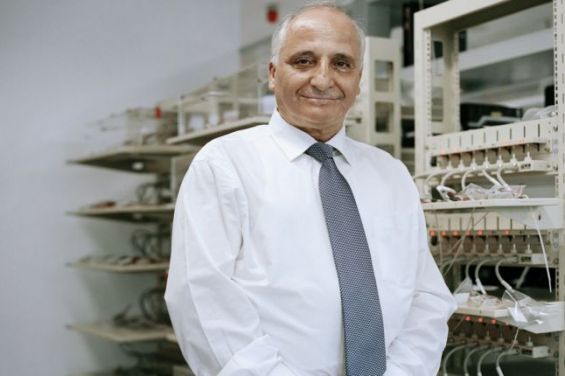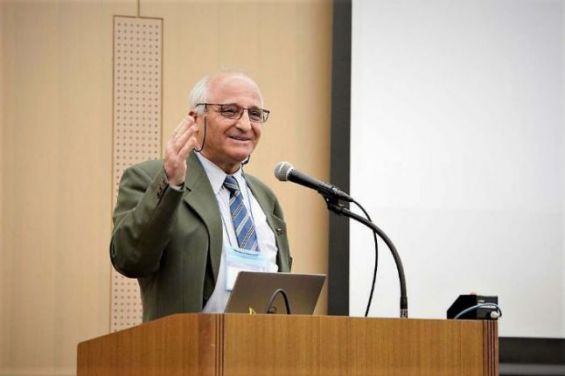On the phone, Rachid Yazami was happy, joyful and positive about what life had granted him. Every chapter of his journey had an anecdote to it that made it exciting and entertaining to know about. Head of the French National Centre for Scientific Research (CNRS) in France, he landed a career that many Moroccans would envy. Being at the heart of several inventions and discoveries, his work has or will revolutionize our daily lives, including his battery research.
Like his batteries, Rachid Yazami has an ultra-charged memory. His career had taken a significant turn in 1972, when he was a student at the Faculty of Science in Rabat. «One day, I received a telegram in the middle of August that said ‘You are admitted to math sup, join Pierre Corneille Rouen school immediately», the scientist told Yabiladi. His parents «made a sacrifice» buying him a plane ticket. Three years of hard work followed that important telegram, «those were the hardest years ever» where solitude and a huge amount of work defined his daily life. As a result, he was showered by school offers but the young man went for Grenoble.
«In 1975, I chose the Polytechnic Institute which had six engineering schools. The best rated one was the IT school. I was offered to study applied mathematics but I said no stressing that I wanted to do chemistry because Morocco was known for phosphate extractions. Then I went for the National Electrochemistry and Electrometallurgy engineering school at the National Polytechnic Institute of Grenoble. That is when I started getting interested in batteries».
A Moroccan scientist at NASA
In 1978, Rachid Yazami graduated university with an engineering degree and then dedicated his career to research. He obtained a Master of Advanced Studies and then a doctoral degree. His thesis was on the lithium battery today used in all our phones, cars and also electric cars. «The discovery was made around 1979 and 1980. It was a defining moment in my career but unfortunately at the time, neither CNRS nor the French industry believed in it».
Determined to achieve his dreams, Yazami decided to apply for a position at the CNRS in 1985. «I did it without really believing in it because I thought that for a Moroccan national it would be hard to be part of such an organization», said the 65-year-old man. Eventually, Yazami joined the prestigious center as Research Associate. «There were only six places and I was one of the ones selected».

Presenting his work in 1983 in San Diego, California, Yazami met a Japanese teacher passionate about discoveries. He invited him to come to Kyoto. «As soon as I got my thesis sorted in 1985, I wrote to him. He had submitted a file to the Japanese Ministry of Scientific Research regarding my visit. In 1988, I flew to Japan, invited by the government», said the scientist. «I seized the opportunity to learn Japanese during my two-year stay in Kyoto and Wedda».
In 1990, Yazami returned to Grenoble and stayed there for ten years. Meanwhile, Sony contacted him to propose a commercialization of his rechargeable lithium battery, in 1991. «They were going to use my discovery, the graphite anode», he told Yabiladi.
Two years later, the Moroccan scientist attended a pivotal meeting in San Francisco. Organized by the director of NASA’s battery research program, Yazami was invited to chair the conference, having the opportunity to visit the agency’s research lab in Pasadena.
«During the visit, he opened the door of an office and said : ‘That is your office Rachid, you come whenever you want, you spend a day, a week, a year, ten years, you are welcome here». At the time, Yazami had refused the proposal. «Believe it or not, in 2000, I went back and realized that he had indeed kept the office».
«The battery research was carried out at the NASA Jet Propulsion Laboratory (JPL) in collaboration with the California Institute of Technology. I worked there indirectly, sponsored by NASA».
Offering Morocco his discovery
After leading a successful scientific career in the USA, Rachid Yazami decided to start his own business in California in 2007 and developed another type of battery. «I raised more than $ 20 million for the start-up. It was a historic Cal Tech record. No one has ever raised that amount of money in the first attempt, including Apple and Windows», he said with a proud voice. The prospects for development will be less promising following the cessation of subsidies for lithium during the second term of George W. Bush.
In 2010, an acquaintance of Rachid Yazami informed him that a professor from Singapore wanted to meet him. The latter invited the scientist to inaugurate an energy research center. «In fact it was a trap : They wanted me to stay in Singapore. I told my family the same evening when I returned to France. My wife said : Let’s go», said Yazami adding «since then we’ve been settled down there».
Despite being recognized internationally, by winning the National Academy of Engineering Draper Prize in 2014, being decorated by King Mohammed VI and being appointed member of the Hassan II Academy of Sciences and Technology, the Moroccan inventor is a humble man who is attached to his motherland. «Morocco, I go there five times a year. We always keep the idea that we can do things but the Kingdom must be ready. Things have to go both ways». His status inside the Academy of Sciences is an «opportunity to give back everything that Morocco has given me in the past», he said.
His latest finding is expected to change the world : a way to charge batteries in the shortest time possible. Rachid Yazami explains : «We have the device that does it while the current chargers of Apple or Samsung do not do it.»
«This technology can easily be launched in Morocco. If investors want to put money in, I can go back home. One of them told me 'Rachid, this is a multi-billion dollar technology'. Imagine if the international press headlined: 'Morocco, the African country and the first country in the world to release the technology that recharges mobile phones and electric cars in ten minutes'!»




 chargement...
chargement...












